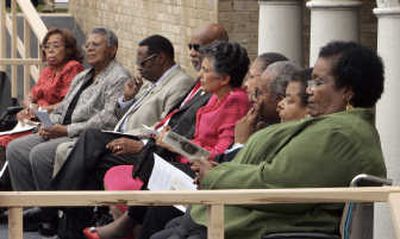Little Rock Nine return to cheers

LITTLE ROCK, Ark. – This time around, the Little Rock Nine pulled up at the high school in three white stretch limousines.
Five decades ago, they had to walk through a gantlet of jeering whites spewing venomous threats. Tuesday, fans swarmed them for autographs and pictures. News crews lobbed softball questions. In front of a crowd of 5,000 people, dignitaries including former President Clinton, governors, congressmen and the mayor were on hand to laud their bravery in desegregating the school.
The nine former students had returned to the campus of Little Rock Central High School a half-century after President Eisenhower had ordered soldiers to escort them into the school.
“We thought this was a place that would accept us,” one of the nine, Ernest Green, told the crowd. “And you know what? Fifty years later, I think we were right!”
It was a day of unmitigated adulation of the nine, and of recognition about how much their determination to attend the school had propelled the desegregation movement forward.
Their decision to attend despite the dangers, backed by the federal show of force, made it clear throughout the nation that the 1954 Supreme Court ruling of Brown v. Board of Education would be enforced.
But off the podium here, in private conversations, there was also concern that their achievements had been in part undone by other social changes. Many school districts around the country, for instance, are becoming more segregated along racial lines.
“The forces that resisted the desegregation of Little Rock have never stopped fighting,” the Rev. Jesse Jackson said. “Those who rejected the dream are still rejecting the dream.”
With the growth of private religious academies, vouchers and charter schools, Jackson said, black and white students are less likely to attend school together. He noted the difficulties of integrating schools when whites leave urban areas, leaving behind what he called “the hole in the doughnut.”
His observations are borne out in Little Rock and elsewhere in the United States by statistics from the Civil Rights Project at UCLA.
The high point of desegregation in the Little Rock School District came in 1980, when the average black student attended a school that was 50 percent white. Today, the average black student attends a school that is 20 percent white.
“There’s been a huge decline – it takes us back to the kinds of numbers we had in the late ‘60s,” said Gary Orfield, a professor of education at UCLA.
The student body at Little Rock Central High School is 53 percent black and 40 percent white, with 7 percent reporting a different race.
None of this changed the ebullient mood Tuesday.
“This day should be about gratitude for all of us,” Clinton told the crowd. “I’m grateful that they’ve lived 50 years and that we can see them” and learn the lessons of their actions.
He said that as an 11-year-old Arkansan, he had heard of their exploits and that they changed him, shaping his life.
“They made me decide not just to have an opinion, but to have conviction,” he told the crowd.
But while Clinton received warm applause, the brief appearances by the nine captivated the crowd. They are an accomplished group, earning numerous bachelor’s and master’s degrees, though generally heavier and grayer. Two of them used wheelchairs.
On the podium, they thanked their parents and advised youngsters to be diligent. If they particularly recalled anything about those turbulent times, it was not being spit on, insulted or threatened. It was the humor and determination.
D’Angelo Holiday, 11, of Little Rock, had a poster on which he had collected the signature of each of the nine. He was thrilled, he said.
“They made a difference by showing that they are no different from white people and they have the same right to an education,” he said.
“I am grateful that my country is reconsidering its past,” said Gloria Ray Karlmark, whose career has included being a schoolteacher, systems analyst and technical writer. “A mistake was made and we’re dealing with it. That’s the American way.”